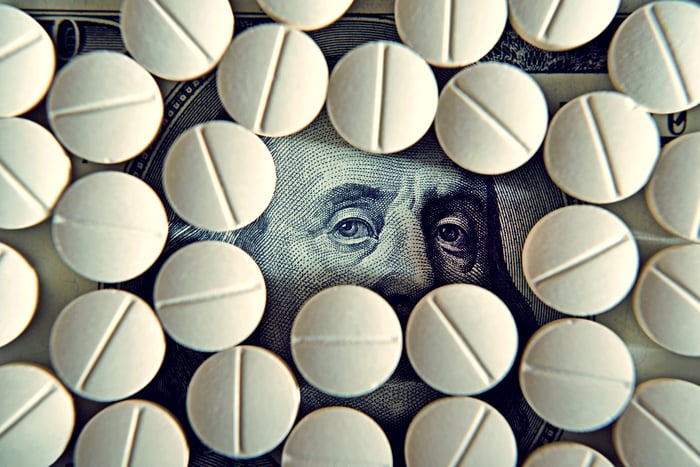There's little question that Berkshire Hathaway (BRK.A 0.98%) (BRK.B 0.98%) CEO Warren Buffett is one of the greatest investors of our generation. For the past 55 years, he's led Berkshire Hathaway's stock to an average annual return of 20.3%. That may not sound like much considering that we just exited a phenomenal 11-year bull market, but in aggregate, this gain works out to 2,744,062% since 1965.
Buffett has proven time and again that he's a master at finding value hidden in plain sight. The thing is, investors can find deeply discounted value within Buffett's own portfolio. Among the 46 securities currently held by Berkshire Hathaway, the following three are still historically cheap, even after the S&P 500 bounced 40% off of its recent lows.

Berkshire Hathaway CEO Warren Buffett at his company's annual shareholder meeting. Image source: The Motley Fool.
U.S. Bancorp
With the exception of oil and gas drillers, few industries have been hit as hard by the coronavirus disease 2019 (COVID-19) pandemic as bank stocks. The Federal Reserve lowering its federal funds rate back to an all-time low of 0% to 0.25% is expected to weigh on the interest income potential of banks. At the same time, high levels of unemployment and economic restart uncertainties could cause loan delinquencies to rise.
Yet, despite all of these concerns, U.S. Bancorp (USB 0.98%) looks cheaper than it has in quite some time. The Minnesota-based bank closed this past Wednesday, June 3, at 28% above its book value. That's its cheapest valuation, relative to book value, in at least a decade.
For much of the past decade, U.S. Bancorp was valued anywhere between 70% and 110% above its book value. The reason it commands such a premium is because U.S. Bancorp consistently produces the highest return on assets of all the big banks. And too boot, all of its bread-and-butter metrics, such as loans and deposits, are headed in the right direction.
At the same time, U.S. Bancorp should be commended for controlling its costs and avoiding risky derivative investments. Avoiding risk allowed it to rebound much quicker than its peers following the Great Recession, while closing some of its physical branches and coercing its customers to lean on digital and mobile banking solutions has helped to lower costs.
There's simply not a more efficient big bank out there, and yet it's still arguably cheap.

Image source: Getty Images.
Teva Pharmaceutical Industries
In terms of fundamentally inexpensive stocks, they simply don't get any cheaper in Buffett's portfolio than brand-name and generic drugmaker Teva Pharmaceutical Industries (TEVA -0.20%). Based on its June 3 closing price, Teva is valued at less than 5 times next year's per-share profit estimate.
Why so cheap for a profitable drugmaker? The answer to that question lies with Teva's numerous shortcomings in recent years. It's settled bribery charges, had its top-selling brand-name drug (Copaxone) lose exclusivity, been buried under debt following the Actavis acquisition, and has more recently caught flak for its role in the opioid crisis. But Teva has a secret weapon, and his name is Kare Schultz.
Schultz was hired in September 2017 as CEO, and his contract was recently extended through November 2023. He's a turnaround specialist, and he's worked wonders for Teva in less than three years. By the end of this year, Teva will have reduced its annual operating expenses by $3 billion, and as of its most recent quarter, it had lowered its net debt to $24.3 billion. Schultz has helped reduce the company's net debt by almost $10 billion since taking over. There's clearly still work to be done with regard to strengthening the company's balance sheet, but with $2 billion or more in annual operating cash flow, Teva is in much stronger shape than its share price appears to reflect.
Furthermore, buying Teva is simply a bet on an aging global population gaining increased access to pharmaceutical products. As a premier producer of generics, Teva is well-positioned to benefit, and it should see improved pricing power on its generics over the long run.

Image source: Getty Images.
Amazon
Lastly, and to really throw a curveball at you, e-commerce giant Amazon (AMZN 1.62%) looks to be historically cheap, even though it's nipping at a new all-time high.
How in my right mind can I justify Amazon as a "historically cheap" stock when it's valued at 66 times next year's consensus per-share profit forecast? Simple: I'm not focused on the company's profit potential.
There are a lot of ways to measure value, and the price-to-earnings ratio has never been a particularly good indicator of value for Amazon. Rather, I prefer price-to-cash-flow, because Amazon is constantly reinvesting its operating cash flow back into its various business segments. Over the past five years, Amazon has averaged a multiple of 30 times its operating cash flow. However, based on Wall Street's cash flow per share estimates, Amazon is currently trading at about 23 times next year's cash flow and just 12 times its cash flow in 2023. If Amazon were to dip below about 23 times cash flow, we'd be talking about a decade low.
Though Amazon's e-commerce operations are great, and they're what drive consumers to purchase Prime and stay within the Amazon seller ecosystem, it's really cloud services that'll drive Amazon's operating cash-flow growth in the years to come. Amazon Web Services generates considerably juicier margins than retail and ad-based revenue, which is what could triple Amazon's cash flow between 2019 and 2023.
Despite sporting a nearly $2,500 price tag per share, Amazon stock is still historically cheap.





